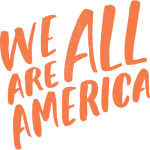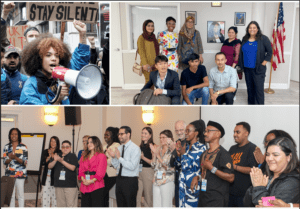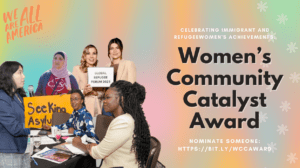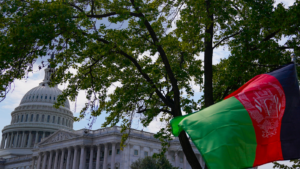This medium article is part two of a three-part interview series highlighting We Are All America’s Afghan Housing & Welcoming Community Navigator program. This second interview highlights the work of David Malikyar, the Afghan Housing & Community Navigator for We Are All America & CHIRLA working with Afghan refugees in California.
Can you introduce yourself and your background? (Please feel free to include any relevant education experience, prior work experience, volunteering, etc.)
My name is David,I am the Afghan Housing and Welcoming navigator at CHIRLA. I was born in Kabul, Afghanistan. I have lived in the US since the Soviet invasion of Afghanistan. I’ve had the pleasure of serving this population for 30+ years, and one of the main reasons I am involved is because of my parents. They were passionate about this work and instilled in me compassion to work with the lesser fortunate population. I am a refugee myself from Afghanistan. My mother was an educator who taught Dari literature at the University of Kabul, and my father was a diplomat. My interest comes from my parents.
I also have a lot of experience having gone through all the steps, such as learning English through ESL (English as a Second Language). I have advocated with my parents and many others since those early days. I have been very privileged and honored to serve in this capacity at CHIRLA because we make profound differences in the lives of the newly arrived refugees. Not only for the Afghan population but for all refugees in mind. The attitude we have is equal for everyone.

What has your experience working as the Afghan community navigator in CA?
It has been a humbling and learning experience despite my experience in the field. In the experience of working with families, the intentions are to support them and remove obstacles and barriers to help them with integration, and eventually thriving in their communities. And so many words bring the best of them to their new homes in the United States. We are willing and able to serve any population in need. We want to level the playing field for the newly arrived refugees as much as possible. My attitude is that yes, we can, si se puede.
In your experience, what are some of the challenges that Afghan community members have to face?
For the Afghans and newly arrived refugees, the barriers are many. This includes adjusting to an entirely new wave of life, navigating a new system, and understanding the laws, rules, and regulations to which we are held accountable to live in the US. One of the major obstacles that we are facing right now is the shortage of housing, that is the land over the country in the US. This is the biggest problem.
The second is navigating the system and understanding the system. The challenges to that end include language, cultural differences, and the overall navigation of life in the US. This is to include public transportation, healthcare, education, employment, money management, and police interactions, to mention a few. And to that end, we’re doing ongoing orientation and disseminating up-to-date information as it is provided to us by the government, state, county, and the resettlement agencies.
How have you assisted families in integrating into their new communities?
I help my fellow Afghans through in-person community involvement, one-on-one conversations with them, and group orientations in larger gatherings. This includes community gatherings or gatherings at the mosque. We have done orientations for as many as 80 in one sitting. And this is closely coordinated with the Resettlement Agencies (RA’s) and the other supporting non-profit groups. I am also on weekly task force calls for the state and housing task force calls. This is a space where RAs and supporting agencies discuss challenges and the resolutions to the problems by sharing them in our forums and collective direction and working jointly. I also have occasional one-on-one calls with community leaders, whether they are from the state, county, or other supporting agencies. The State of California has been a pioneer and leader in introducing programs designed for the Afghan population such as the Afghan Support and Investment Program (ASIP), Afghan Integration and Resettlement Services (AIRS) Project, and Afghan Support Community Program, (ACS). These programs can easily serve as a model for other states, these programs and resources are instrumental as they add layers of support to our clients and our work.

What has been the most rewarding aspect of your position?
This position is very rewarding, we just need to look for the reward, and that often manifests in the phone calls and texts with the folks I have helped. Also seeing families moving from a baseline of zero to integration, or many families who have passed 6 months and seeing them progress beyond integration gives me great joy. This way we have found them a house, a central location where they can operate, a place they can see as a safe haven once they return from work or school. Helping them build a new life with a fresh start, moving towards positivity.
Is there anything else you would like to share?
I am very blessed to be working with such a caring group of people, not just CHIRLA, but everyone who is doing this work. I appreciate working with like-minded people and people who have compassion in their hearts. I see this newly arrived population as a great resource and future asset for this country and their respective communities. I know that a majority will be able to pay it back. I must mention the need for equitable support and services for all immigrants as we have noticed some groups of newcomers being left afloat.
I hope that this position can serve as a blueprint for more community navigator programs so that all refugees can have equitable access to resources, regardless of their nationality or background, because all refugees deserve our support and welcome.

For this part of the interview, we asked several agencies and organizations, along with clients, to provide some insight regarding their experiences with having David as the Afghan Community and Housing Navigator. The following are testimonies from several clients with whom David has worked on their journey of rebuilding their new lives in California.
“We have now found our father and our mother, and our caretaker embedded in your person,” said a recently resettled family of four.
“We were looking for a person like you in Heaven, but we found you on earth. You have been instrumental in putting our heads at ease in guiding us with wisdom,” said one Afghan family.
“We have dealt with many people in our journey to America. We are certainly very blessed to have found you as one of those people who has made a great impact on our lives by guiding us and following up with us. As a result, we are now going to be housed and our kids are in school. We are in adult school, and we have great job prospects,” said another client whom David worked closely with.
“We went from a bare apartment to a furnished one. This includes a refrigerator, television, couches, beds, and all other furniture,” said the recently arrived family of five. “You are very kind to our children and women. We appreciate your patience and your soft-spokenness. God bless you.”
After assisting with the welcoming center the Federal Emergency Management Agency (FEMA) sent this email: “We’re very thankful for CHIRLA & your service. Our expertise and interaction with folks at the centers made a difference not only to the folks but also to the FEMA team. Fema hopes to have you at more functions like these in the future.”
David, how do you feel reading these quotes?
This [serving incoming refugees] is an extremely worthy cause very close to my heart, and I’m delighted to be able to continue this with CHIRLA. It’s a blessing.



